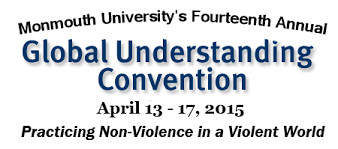WEST LONG BRANCH, NJ— The 14 annual Global Understanding convention discussed the importance of nonviolence in different faith practices in the Magill Commons on Monday, April 13, 2015.
Five panelists gathered to discuss their individual religious practices and share their perspectives on the ways in which dialogue facilitates peace. While each panelist represented a different religion, they all shared one commonality: the desire for nonviolence in faith.

According to freshman student and Global Understanding volunteer Richard Adamcyzk, the aim of the “Global Understanding convention [is] to spread an understanding about different cultures so that students can become more understanding of different people.”
The convention began with panelist speaker Joe Ritacco, a computer scientist who has seen many different parts of the world. Ritacco began the convention and briefly introduced some of the main concerns within each religion, violence and extremists. In his talk, Ritacco said, “religion is not the source of conflict, but can be used to fan it.” It is not the actual religion that begins wars and violence, he asserted, but the incapability to see from another religious viewpoint that can get people into trouble.
The panelists then introduced themselves as well as their religions. Rabbi Marc Kline, whose faith is Reform Judaism, was the first to address the crowd, stating, “Religion is quantitative, not qualitative. They are labels.” Kline began his career as lawyer and later became a Rabbi in 1995.
In his discussion, Kline dispelled two myths of Reform Judaism. First, he stated “the Old Testament is not a Jewish book;” the book that is a Jewish book is the Book of Esther. The second myth was that “the God of the Bible is not God, it’s a character of the story.” Kline went into detail to say that the word “Israel” technically means “God wrestling,” and that the purpose of the Bible is to create conversation. Kline said that everyone should challenge their faiths and ask questions because that is what provokes thought and understanding.
The next panelist to speak was Dr. Mohammad Ali Chaudry, the first Muslim-born Pakistani Mayor in America and a representative of Islamic faith at the convention. Chaudry teaches at Rutgers University and has appeared on television and radio programs, including Fox News. He believes in the value of interfaith dialogue, and presented the question, “How will we make a difference if we do not say or do anything when others speak badly of other faiths?”
Chaudry explained the two primary sources of Islamic faith: the Quran and the sayings of the prophet Muhammad. The Quran emphasizes that there should be balance within all interactions, and the prophet Muhammad said that his followers would be people of the “middle course.” Because the Islamic faith was built on the “middle course,” many Muslims are often upset with extremists of their faith. The prophet did not respond with violence, and Chaudry emphasized the importance to stand up against that. “If you get to know people and engage with them as human beings, the messages [in Mosques] are peaceful,” Chaudry said.
The next speaker was Tonie Malone of the Roman Catholic faith, a former professor of Christian nonviolence at Seton Hall University. Malone jokingly began by saying, “I suppose I should begin by apologizing for the crusades.” She then continued on a serious note to explain that Christians were pacifists for the first 300 years of the religion’s existence. However Augustine was the man who later accepted the “just war” theory, saying that “a war is permissible only to confront a real and certain danger,” which opened up that violence is sometimes okay.
Some common role models of the Roman Catholic faith are Jesus, Gandhi, Martin Luther King Jr., and Dorothy Day. These historical figures have proved that “Christian nonviolence does not mean doing nothing,” Malone said. “It means rejecting evil and loving our enemies and those who persecute us.”
The last speaker to go was Eleanor Novek, a professor at both Monmouth University and a peace educator in the New Jersey prison system. Novek represented the Quaker faith, which has remained pacifist throughout its existence. Quakerism arose in the 1650s in England for those who were unsatisfied with the current religions. The founders are now called “friends of the truth.” One of the past leaders, George Fox, coined the term “Quaker” while in court by saying, “Quake in the word of God.”
There are four generally understood concepts of Quakerism, which include that the divine spirit is in every person, the spirit of God will lead to the truth, there are no ordained priests, and the belief in an ongoing revelation. Quakers were involved with helping women’s rights, Jewish refugees, and slaves early before others started to join in. From some of these actions, Quakers in the United States were later awarded a Nobel Peace Prize in 1947.
According to Dr. Chaudry, “it is absolutely critical for young people in your age group, and of course other ages as well, to engage with other people so that you have a better understanding of your own faith as you learn about the others. So I think that having workshops like this are absolutely critical. It opens your eyes and gives you a chance to think about things that you may not otherwise think about.”




